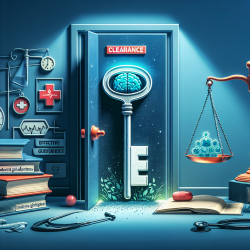Understanding the Importance of Medical Clearance in Psychiatric Emergencies
As a practitioner in the field of emergency psychiatry, you are often faced with the challenge of evaluating psychiatric patients who present in the emergency department (ED). The process of medical clearance is crucial, yet it is fraught with controversy and lacks nationally accepted standards. The American Association for Emergency Psychiatry Task Force has addressed this issue by providing evidence-based guidelines to improve the medical evaluation of psychiatric patients in the ED.
Key Findings from the Research
The task force conducted a thorough review of existing literature and combined it with expert consensus to develop guidelines that can help practitioners enhance their skills in medical clearance. Here are some of the key outcomes from their research:
- Emergency physicians should collaborate with psychiatric facilities to minimize unnecessary testing while enhancing the quality of medical screenings.
- Medical clearance should not imply that all medical conditions have been ruled out. Instead, it should indicate that there is no acute need for medical intervention that would prevent psychiatric evaluation or transfer.
- A thorough history and physical examination, including vital signs, are the minimum necessary elements in the evaluation of psychiatric patients.
- Routine laboratory testing for alert, cooperative patients with normal vital signs and a noncontributory history and physical examination is generally of low yield and not necessary.
Implementing the Guidelines in Practice
For practitioners, the implementation of these guidelines can lead to more efficient and effective medical clearance processes. Here are some practical steps to consider:
- Foster strong communication and collaboration between emergency physicians and psychiatric facilities to ensure a seamless transition for patients.
- Focus on obtaining a comprehensive history and conducting a detailed physical examination as the primary means of medical evaluation.
- Reserve laboratory testing for cases where the history and physical examination suggest a potential medical issue that requires further investigation.
- Educate staff on the importance of accurate documentation and clear communication regarding the patient's clinical condition rather than relying solely on the term "medically clear."
Encouraging Further Research
While the guidelines provided by the task force offer a solid foundation, there is still much to learn about the nuances of medical clearance in psychiatric emergencies. Practitioners are encouraged to engage in further research and contribute to the ongoing dialogue in this field. By staying informed and actively participating in research efforts, you can help shape the future of emergency psychiatry and improve patient outcomes.
To read the original research paper, please follow this link: American Association for Emergency Psychiatry Task Force on Medical Clearance of Adults Part I: Introduction, Review and Evidence-Based Guidelines.










